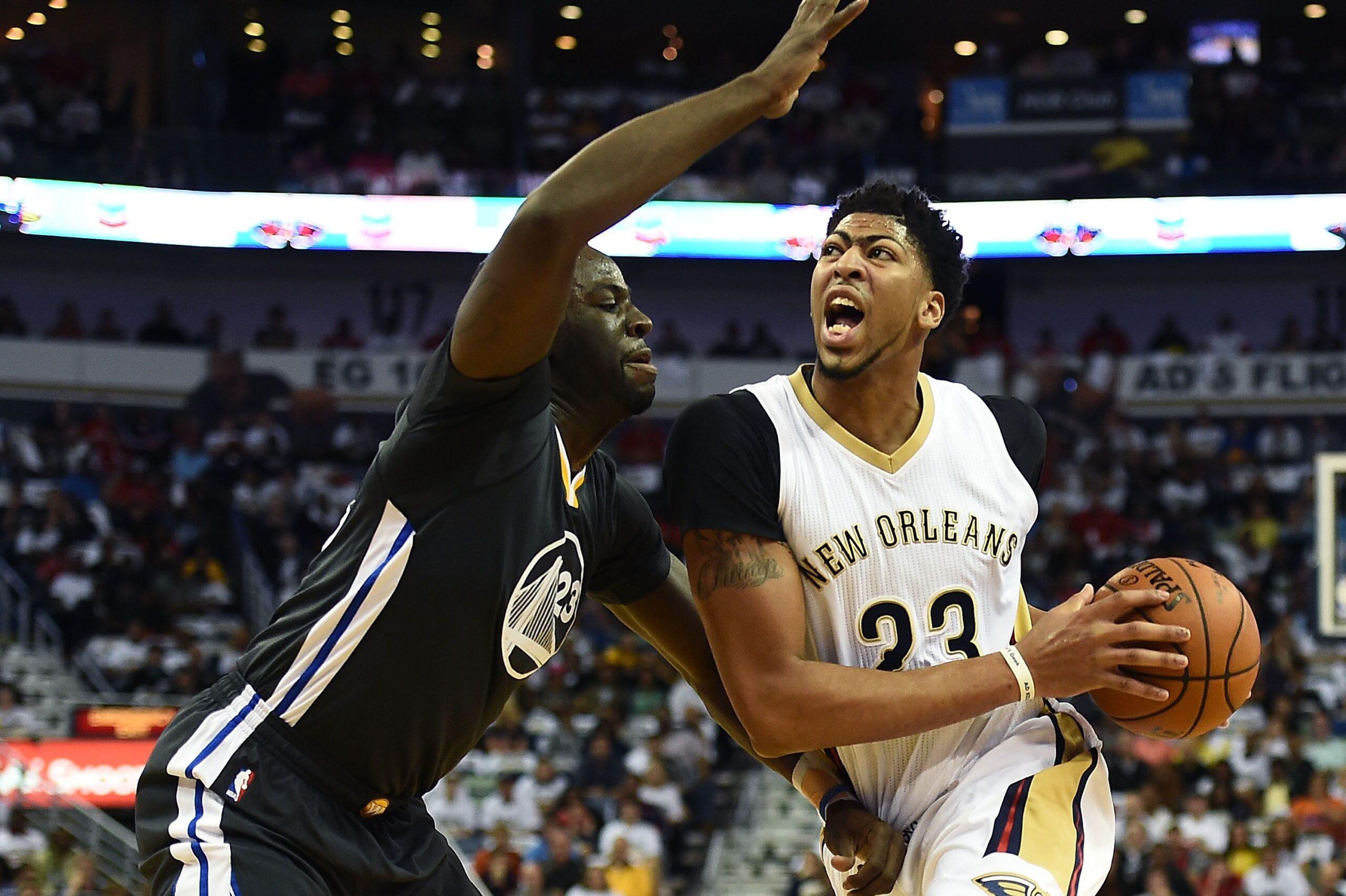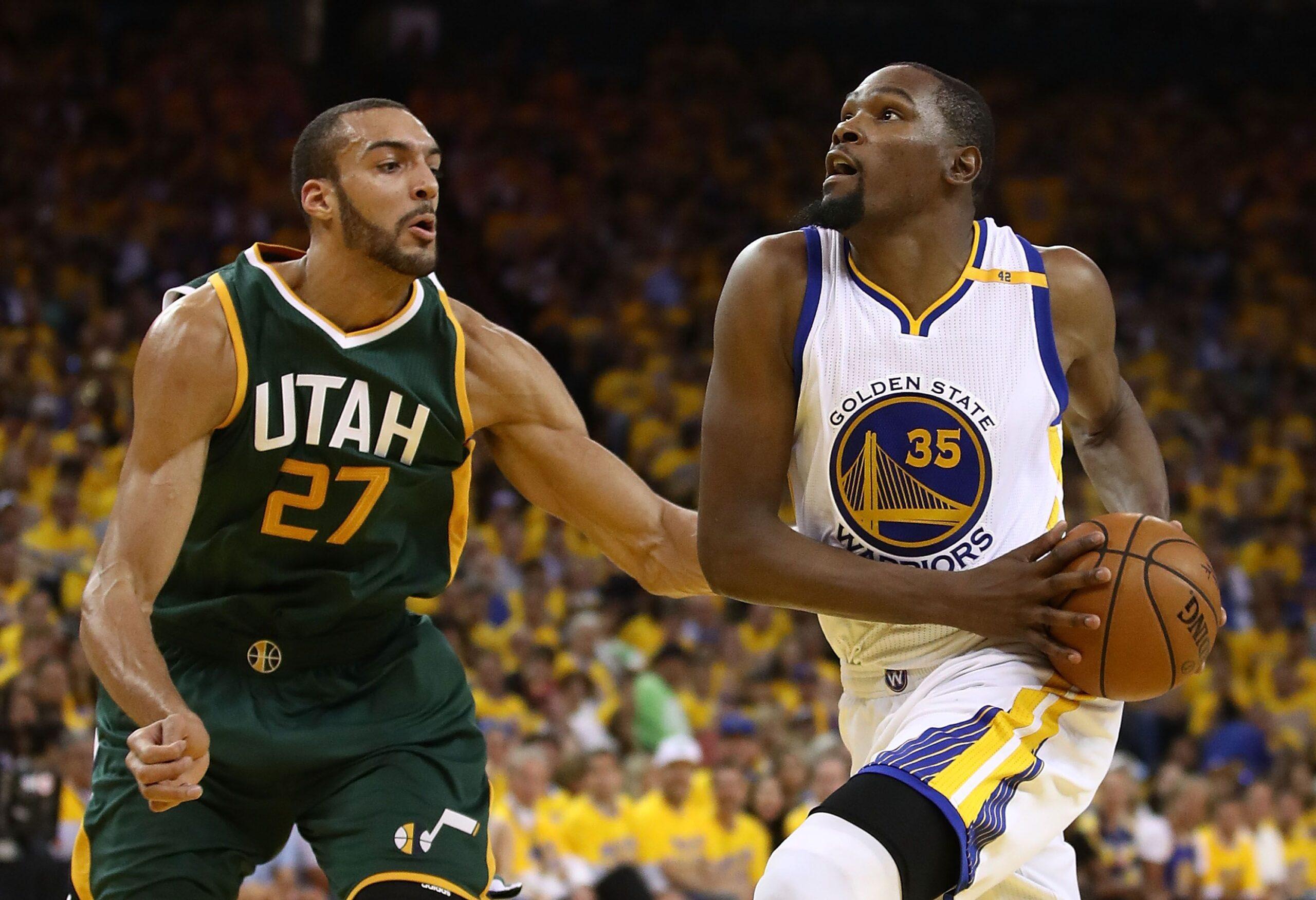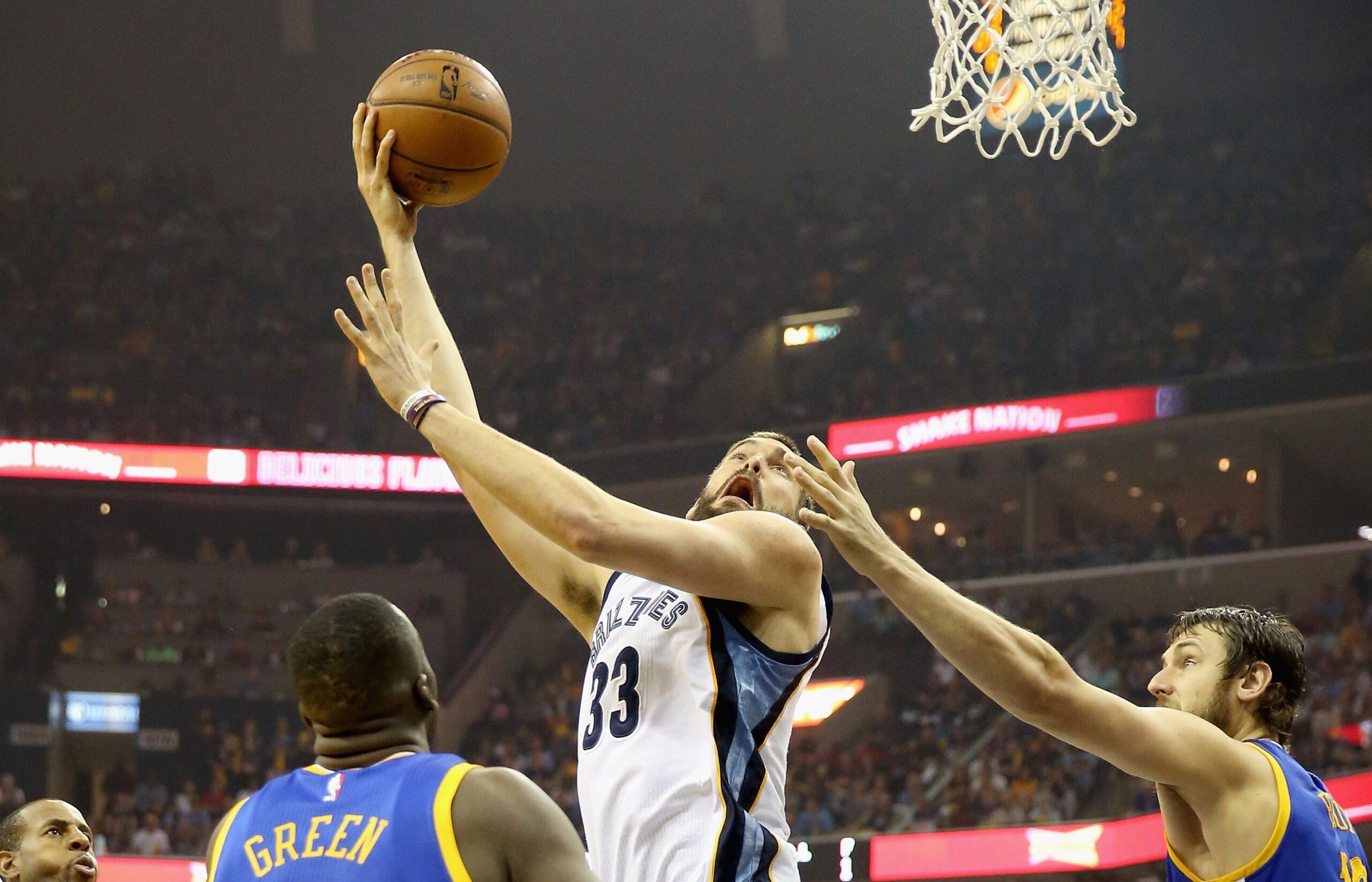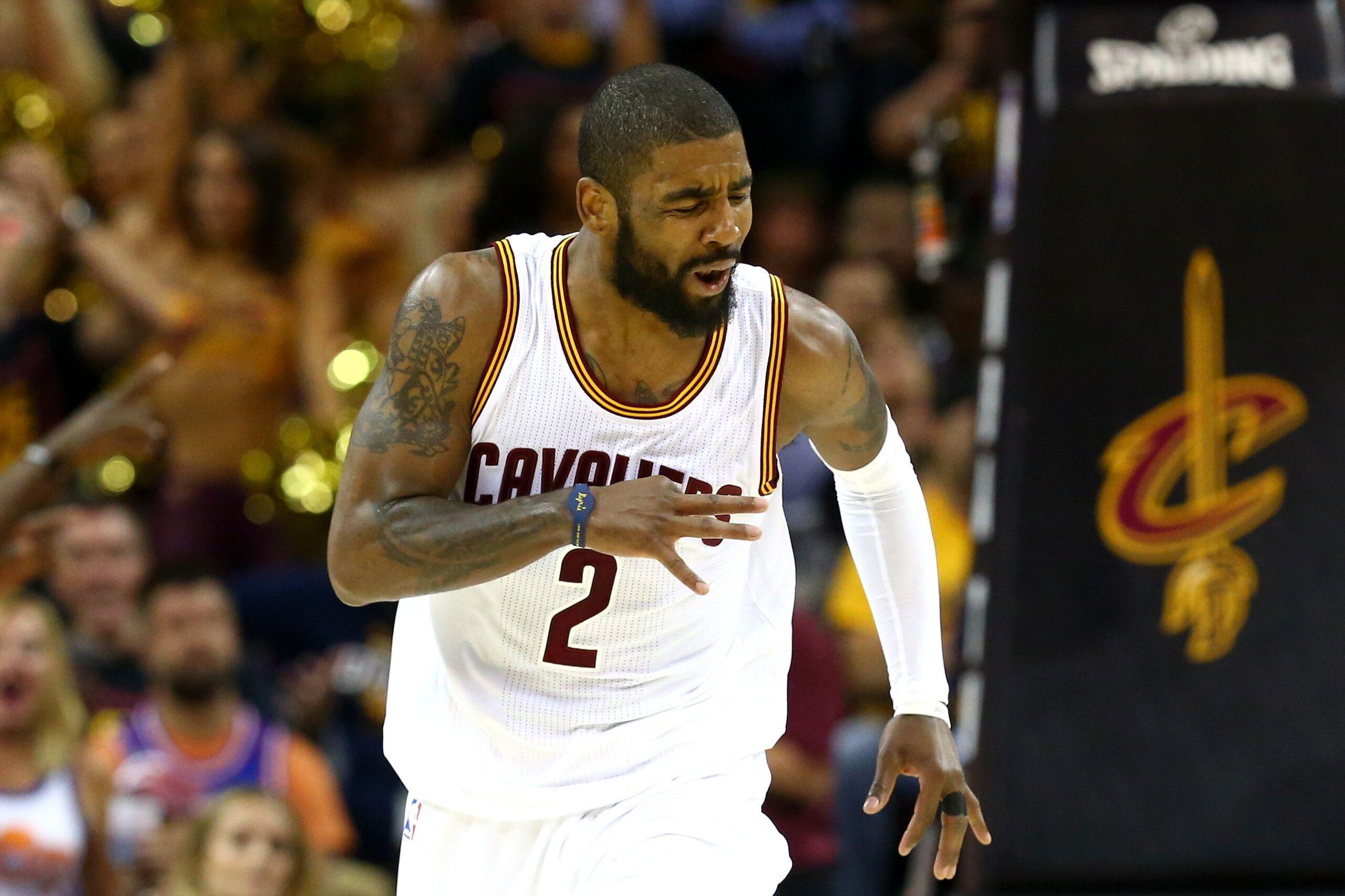Among the many ways to quantify the Warriors’ impressive dominance over the past five seasons, this ranks near the top: Since Steve Kerr took over as head coach ahead of the 2014-15 NBA season, Golden State is 69-24 in playoff games. That’s as many wins as the Rockets, Spurs, and Thunder have combined in that span; it’s the winning-percentage equivalent of a 61-win season against the most difficult opponents in the league.
But which opponent from that group was the best? Which was the worst? Golden State has played so many over the past five seasons that, midway through their latest series against James Harden’s Rockets, we decided to rank the lot of them—as well as the six opponents they could face in this season’s conference finals and NBA Finals, if they make it that far. How each of those teams actually fared against the Warriors doesn’t factor into our rankings. Instead, we scored the Warriors’ 24 past, current, and possible future opponents on overall team quality entering their series against Golden State.
We looked at each team’s regular-season net rating and its playoff net rating before meeting Golden State (both with garbage-time minutes removed, using numbers from Cleaning the Glass). Then we adjusted for the playoff strength of schedule and blended all the numbers together to produce a final “net rating” and our order, listed from least imposing to most. (The teams that the Warriors could face this season are marked with an asterisk next to their name.) The Warriors beat all of the teams they’ve played in this span except one, so even the best teams among this group largely failed to disrupt the Golden State machine. But, spoiler: The 2016 Cavaliers are not at the top of our list. Here are the results:
24. 2017 Trail Blazers
Round: First
Series record: Lost 4-0
Regular-season record: 41-41
Net rating vs. average team: -1.1
The 2017 Blazers are the only playoff opponent in recent Warriors history to finish the regular season with a negative point differential. Golden State made quick work of Portland in Kevin Durant’s first postseason series with the team, waxing the Blazers by an average of 18 points per game over the course of the sweep. Even with Durant’s missing two games—and Patrick McCaw replacing him in the starting lineup—Golden State shot 40.3 percent from 3 as a team.
23. 2016 Rockets
Round: First
Series record: Lost 4-1
Regular-season record: 41-41
Net rating vs. average team: 0.2
Announcers can’t stop talking about how the Rockets have faced the Warriors four times in five postseasons—but while Golden State has been a consistent contender over that span, Houston has taken several different forms. The 2016 edition was by far the worst, as Houston stumbled into the postseason with a .500 record in the last and most tumultuous Dwight Howard season.
The Rockets’ only win in this series came by one point; overall, the Warriors outscored Houston by 18.8 points per game, their largest margin against any playoff opponent in this five-year run. Then Howard left, the Rockets rejiggered their strategy, and a new threat to Golden State’s dominance was born.
22. 2019 Clippers
Round: First
Series record: Lost 4-2
Regular-season record: 48-34
Net rating vs. average team: 0.7
The Clippers pushed Golden State further than any other first-round opponent, winning two games—in Oakland—and necessitating some Durant heroics to ensure the Warriors’ advance. But heading into the series, L.A. seemed like a pushover after finishing the regular season with an underwhelming point differential and little star power to compare with the Warriors’ galaxy of stars. Perhaps the next time the ascendant franchise takes on Golden State in the playoffs, the matchup will look more even from the jump.
21. 2015 Pelicans
Round: First
Series record: Lost 4-0
Regular-season record: 45-37
Net rating vs. average team: 0.8

The Warriors’ first playoff opponent in their title-winning stretch kept each game in a sweep relatively close: Golden State’s biggest win was just 11 points. Anthony Davis nearly single-handedly kept the Pelicans in games, averaging 31.5 points and 11 rebounds per game in the series. Alas, in what would go on to be the story of Davis’s New Orleans tenure, he didn’t have much support—his fellow frontcourt starters were Quincy Pondexter (who missed two straight seasons because of injuries after this series) and Omer Asik (who became obsolete almost immediately after this series). In the four seasons since, the Pelicans have returned to the playoffs just once and collected a cumulative 156-183 record. What a disaster.
20. 2018 Cavaliers
Round: NBA Finals
Series record: Lost 4-0
Regular-season record: 50-32
Net rating vs. average team: 2.0
It will be a while before another Cavaliers team appears on this list because the final LeBron James team in Cleveland was markedly worse than the other editions. This team’s net rating ranked 15th that regular season, and it didn’t improve much in the playoffs: The Cavs were outscored across a seven-game-series win against Indiana in the first round and needed seven more games to squeak by Boston in the conference finals. The mediocrity led to a Finals sweep—and maybe helped convince LeBron to leave the city again later that summer—but at least it gave one indelible memory.
19. 2016 Trail Blazers
Round: Second
Series record: Lost 4-1
Regular-season record: 44-38
Net rating vs. average team: 2.1
This largely unmemorable series was a shooting bonanza, as Portland shot 42.8 percent from 3 while Golden State shot 41.0 percent—the Warriors’ highest in a single series in the past five years. But just as the 2017 Blazers represent Golden State’s weakest first-round opponent to date, the 2016 version represents Golden State’s weakest second-round opponent, too, after Portland benefited from Chris Paul and Blake Griffin injuries to overcome a 2-0 series deficit against the Clippers in Round 1. Read on to find out whether the 2019 Blazers would represent Golden State’s weakest third-round opponent if the teams meet later this month!
18. 2018 Spurs
Round: First
Series record: Lost 4-1
Regular-season record: 47-35
Net rating vs. average team: 2.5
On paper, the 2018 Spurs were the strongest first-round opponent Golden State has faced so far, which makes sense given that the Warriors secured the no. 2 seed rather than the no. 1 last year. That’s a relatively low bar to clear, however, and the Warriors advanced in a gentleman’s sweep, surrendering only Game 4 to San Antonio in the final Spurs series for both Manu Ginobili and Tony Parker.
17. 2017 Jazz
Round: Second
Series vs. Warriors: Lost 4-0
Regular-season record: 51-31
Net rating vs. average team: 3.4

After winning a road Game 7 against the Clippers in Round 1, the Jazz didn’t stand a chance against the best Warriors team—at least by playoff performance—on record. After Gordon Hayward (in his final games with Utah) and Rudy Gobert, Utah’s leading scorers in the series were Shelvin Mack, 35-year-old Joe Johnson, and Dante Exum. This ranking reflects the team’s general position in the NBA hierarchy: near the top but not even a threat to those already there. Under head coach Quin Snyder, Utah is 2-12 against the Warriors and Rockets in the playoffs and 8-5, with two series wins, against everyone else.
16. 2019 Nuggets*
Regular-season record: 54-28
Net rating vs. average team: 3.6
The net rating and relative ranking for all potential 2019 opponents could still change. If Denver advances to the conference finals with a 50-point victory, for instance, the Nuggets’ ranking would improve between now and the start of the next round. But at the moment, Denver profiles as the Warriors’ easiest remaining prey this season, thanks to both the Nuggets’ playoff struggles—they were the only first-round winner to go seven games—and their underwhelming regular-season statistics. Despite earning the no. 2 seed in the West, Denver’s net rating was the second worst among the eight conference semifinalists, ahead of only Philadelphia’s. Given the ease with which Golden State routed Denver in the regular season, one suspects the same might occur in a conference finals bout.
15. 2015 Rockets
Round: Conference finals
Series record: Lost 4-1
Regular-season record: 56-26
Net rating vs. average team: 4.9
The first James Harden Rockets team to play Golden State in the playoffs probably shouldn’t have received the opportunity at all. The Clippers finished second to Golden State in regular-season net rating that season (Houston placed seventh) and had bested the Spurs (who ranked third) in a thrilling seven-game first round. Had L.A. won its second-round series against Houston, it would rank four spots higher on this list.
But Josh Smith made some 3s and the Clippers collapsed in Game 6, clearing the way for the Rockets to march on to the conference finals instead. Houston proved fairly innocuous competition once there, but it would be back to provide fiercer competition a few years later.
14. 2019 Trail Blazers*
Regular-season record: 53-29
Net rating vs. average team: 5.2
13. 2019 Celtics*
Regular-season record: 49-33
Net rating vs. average team: 5.3
12. 2019 76ers*
Regular-season record: 51-31
Net rating vs. average team: 5.8
We’ll group these three teams together as potential 2019 playoff opponents that at the moment rate as roughly average compared with past Warriors foes. Note that we’ve now encountered both the Nuggets and Blazers but not the 2019 Rockets yet, affirming the popular notion that the conference semifinals would prove Golden State’s biggest test in the West this postseason.
11. 2018 Pelicans
Round: Second
Series record: Lost 4-1
Regular-season record: 48-34
Net rating vs. average team: 6.3
The Pelicans rate this high not because of their regular-season performance but because of their postseason play leading into the Warriors series. New Orleans had blitzed the Blazers in four lopsided games, Davis was playing the best basketball of his career, and the Pelicans seemed like they could, if not actually beat Golden State, at least challenge them. And then the Warriors won in five easy games. It turns out that beating other teams handily doesn’t mean much against the Warriors.
10. 2015 Grizzlies
Round: Second
Series record: Lost 4-2
Regular-season record: 55-27
Net rating vs. average team: 7.4

This series is best remembered for the Warriors’ in-series adjustment of having Andrew Bogut guard Tony Allen, but these Grizzlies were a force of their own and—before this year’s Rockets—the best second-round opponent Golden State had faced. They limited the Warriors to 97.8 points per game—no other Western Conference team in the past five years has kept them below 105 in a series.
9. 2019 Rockets
Round: Second
Regular-season record: 53-29
Net rating vs. average team: 8.0
On the one hand, this year’s Rockets roster isn’t as deep last year’s, and a lackluster first half sullied their regular-season numbers. (They were perhaps the league’s hottest team down the stretch, but full-season results are far more predictive of playoff success.) On the other, they still rate as the best second-round opponent Golden State has faced, and the two familiar foes head into Wednesday’s Game 5 tied at two apiece. Worth a note: The last time Golden State didn’t reach the Finals, LeBron played for the Heat, Warriors coach Mark Jackson started David Lee over Draymond Green, and the Rockets led the league with a 3-point attempt rate (33 percent) that would be well below average in 2019.
8. 2019 Raptors*
Regular-season record: 58-24
Net rating vs. average team: 8.0
It’s strange to suggest that Toronto might be as viable a challenger as this year’s Houston team, and in fairness, this ranking doesn’t account for past playoff success (or lack thereof) or proof of concept against Golden State’s omnipotence. Houston has that experience, particularly after last year’s seven-game try; Toronto, meanwhile, hasn’t reached the Finals in franchise history and has been eliminated from three of the past four postseasons in sweeps. Yet this season’s Raptors might be different. LeBron won’t toy with them as part of another Eastern conquest, for one; for another, Kawhi Leonard gives Toronto a legitimate superstar. Toronto would need to make it past Philadelphia in this round first, and then past either the Bucks or Celtics in the conference finals—but if the Raptors, who top the Rockets by 0.05 points in these ratings, make it as far as the Finals, they could give Golden State a scare.
7. 2017 Spurs
Round: Conference finals
Series record: Lost 4-0
Regular-season record: 61-21
Net rating vs. average team: 8.4
This ranking doesn’t account for Leonard’s injury in Game 1, which came when San Antonio was up by double digits and removed the Spurs star from the rest of the series. San Antonio hasn’t been the same team since. But Spurs fans ruing missed opportunities should look back a year further: Had the 2016 Spurs reached the conference finals against Golden State, they would rank no. 1 on this list. The 2016 team won 67 games and finished with a better regular-season net rating than the 73-win Warriors. But after obliterating the Grizzlies in a first-round sweep, the Spurs lost to the Thunder despite outscoring Oklahoma City over six games.
6. 2015 Cavaliers
Round: NBA Finals
Series record: Lost 4-2
Regular-season record: 53-29
Net rating vs. average team: 8.5
The first LeBron team to face Golden State in the Finals was already missing Kevin Love and lost Kyrie Irving to injury in Game 1, and neither injury is accounted for here, so feel free to mentally move this team a few spots down the list. Still, these Cavaliers made Golden State work for its first title since 1975, taking a 2-1 lead before the insertion of Andre Iguodala to the starting lineup helped the Warriors take advantage of the two rosters’ inherent talent disparity.
5. 2017 Cavaliers
Round: NBA Finals
Series record: Lost 4-1
Regular-season record: 51-31
Net rating vs. average team: 9.3

The 2017 Cavs were a merely decent regular-season team, ranking sixth in the league in net rating, but they reached another level in the playoffs. They swept the Pacers, swept the Raptors, and dispatched the Celtics in five games; their playoff net rating before facing Golden State was the best for any Warriors opponent of this era. (This is true even when adjusting for the Cavs’ relatively stress-free strength of schedule.) It’s somewhat a wonder, then, that they looked so overmatched in the Finals, with only a Game 4 victory preventing a Warriors sweep and 16-0 playoff run. Folding regular-season and playoff performance together, the 2017 team, with Durant in his first season in the Bay Area, was the best Warriors group of this half-decade.
4. 2016 Thunder
Round: Conference finals
Series record: Lost 4-3
Regular-season record: 55-27
Net rating vs. average team: 10.2
Several factors count in the Thunder’s favor. First, the team’s record belies its true quality, as the Thunder posted the point differential of a 59-win team. Second, they steamrollered the Mavericks in the first round of the playoffs, winning in five games by an average of 18.2 points per contest. And third, they upset that tremendous 2016 Spurs team before facing Golden State. With Kevin Durant and Russell Westbrook at the height of their powers, Serge Ibaka and Steven Adams dominant inside, and a 3-1 series lead, Oklahoma City should have won this series.
If they had, the flap of that particular butterfly’s wings might have given the Thunder a title; it probably would have kept Durant away from the Warriors; it almost certainly would have obviated the need for an article like this three years later. But Klay Thompson caught fire at the right time, the Thunder tensed up and blew a Game 7 lead, and the Durant-Westbrook partnership toppled, sending several more Finals appearances and trophies Golden State’s way instead.
3. 2018 Rockets
Round: Conference finals
Series record: Lost 4-3
Regular-season record: 65-17
Net rating vs. average team: 10.7
Out of 21 teams in NBA history to win at least 65 games, 15 won the championship. One of the recent misses was the 2016 Warriors; another was the 2016 Spurs; and a third was the 2018 Rockets. Houston finished with the NBA’s best regular-season record and led Golden State 3-2 before succumbing in the West finals. At least the core of that Rockets team has a chance to avenge its defeat this season, even as the overall roster looks somewhat worse without versatile wings like Trevor Ariza and Luc Mbah a Moute. Last year’s team might have been Houston’s best shot at a title, but that doesn’t mean it was the last.
2. 2016 Cavaliers
Round: NBA Finals
Series record: Won 4-3
Regular-season record: 57-25
Net rating vs. average team: 11.3
Of the four Cavaliers finalists in LeBron’s second stint in Cleveland, the 2016 version was the best in the regular season by a wide margin, and it was almost as dominant as the 2017 version in the playoffs even before beating Golden State. Combine those two factors, and the 2016 Cavaliers look like the best team the Warriors have played in the playoffs.
In general, it’s no surprise that the final three previous opponents on this list all took the Warriors to seven games—and that they’re the only three on the whole list to do so. (Remember, we factored in playoff success only before each team faced the Warriors in these ratings.) Here is the average net rating among Golden State’s past playoff opponents, distributed by how long each series lasted:
Four-game series: 2.7 net rating
Five-game series: 4.2 net rating
Six-game series: 5.5 net rating
Seven-game series: 10.7 net rating
Clearly, the greater the theoretical challenge posed by the opponent, the greater the stress involved. That relationship could be plenty interesting given the no. 1 team in this ranking.
1. 2019 Bucks*
Regular-season record: 60-22
Net rating vs. average team: 12.1
The Bucks, at least for now, rate as the toughest playoff opponent for Golden State—tougher than the Durant-Westbrook Thunder, tougher than the best version of the Harden Rockets, tougher than every LeBron team Golden State faced each June. Maybe it’s time to reconsider Milwaukee as a true contender.
The Bucks were a historically great regular-season team—they finished with the best raw point differential of any Eastern Conference team in the 2010s—and they won their first-round series by a historically lopsided margin. Of course, the same could have been said about the 2016 Spurs, and they lost in the next round. Milwaukee, which holds a 3-1 series edge on Boston going into Wednesday’s Game 5, still needs two more series wins before it gets a crack at Golden State (or Houston, Denver, or Portland, if the Warriors don’t reach the Finals).
But writing off the Bucks after one bad game (ahem, Paul Pierce) looked foolish in the moment given Milwaukee’s track record, and it looks even more foolish now that the Bucks have won three straight. The Bucks don’t have LeBron like the previous no. 1 team on this list, but they have Giannis, who might now be the next-best thing. What a matchup Warriors-Bucks would be—if Houston doesn’t stop Golden State first.
